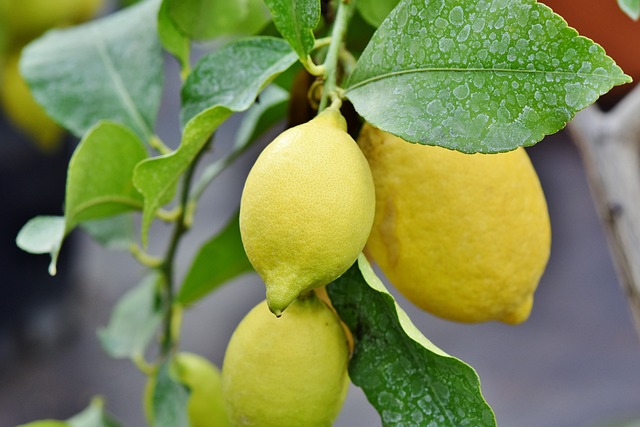Lemon trees are a delightful addition to any garden, offering fragrant blossoms and tart, juicy fruits that can be used in a variety of culinary delights. However, one of the most common questions among lemon tree enthusiasts is whether these citrus beauties can survive the harsh conditions of winter. In this comprehensive guide, we will explore the factors that influence a lemon tree’s ability to withstand winter, provide tips on how to protect them, and discuss the different varieties that are more resilient in colder climates.
Understanding Lemon Trees
Before we delve into the question of winter survival, let’s take a moment to understand lemon trees better. Lemon trees, scientifically known as Citrus limon, belong to the citrus genus and are native to South Asia. They are evergreen, meaning they retain their leaves throughout the year, making them an appealing choice for both ornamental and practical purposes.
Lemon trees require specific conditions to thrive, including:
- Sunlight: Lemon trees thrive in full sun, requiring at least 8-12 hours of sunlight per day. Adequate sunlight helps them produce the energy necessary for growth and fruit production.
- Soil: Well-draining soil is essential for lemon trees. They prefer slightly acidic to neutral soil with a pH level between 6.0 and 7.5. Good drainage prevents root rot, a common issue in lemon trees.
- Water: Consistent watering is crucial, with the soil kept evenly moist but not waterlogged. Lemon trees do not tolerate drought well, and overly wet conditions can lead to root problems.
- Temperature: Lemon trees are sensitive to temperature extremes. They thrive in warm climates, ideally between 70°F to 100°F (21°C to 38°C). However, they can tolerate cooler temperatures for short periods.
Now that we understand the basic requirements for lemon trees let’s explore their winter survival abilities.
Can Lemon Trees Survive Winter?
Lemon trees are naturally adapted to tropical and subtropical climates, making them more susceptible to cold temperatures. However, their ability to survive winter largely depends on various factors, including the specific lemon tree variety, the severity of winter in your region, and the care they receive during the colder months.
Here are the key factors that influence a lemon tree’s chances of surviving winter:
Lemon Tree Variety
Not all lemon tree varieties are created equal when it comes to cold tolerance. Some lemon tree varieties are more resilient in the face of winter conditions, while others are extremely sensitive to cold temperatures.
- Eureka Lemon (Citrus limon ‘Eureka’): Eureka lemon trees are one of the hardier lemon tree varieties and can tolerate temperatures as low as 20°F (-6°C) for short periods. They are a popular choice for gardeners in regions with mild winters.
- Lisbon Lemon (Citrus limon ‘Lisbon’): Lisbon lemon trees are similar in cold tolerance to Eureka lemons and can withstand temperatures down to 20°F (-6°C).
- Meyer Lemon (Citrus × meyeri): Meyer lemon trees are among the most cold-sensitive lemon varieties, with their lower temperature limit being around 32°F (0°C). They are best suited for areas with mild winters or for container gardening that allows for indoor protection during the cold season.
- Ponderosa Lemon (Citrus × pyriformis): Ponderosa lemon trees are less common and have varying cold tolerances depending on the specific cultivar. Some may be more cold-hardy than others, so it’s essential to research the specific type you have.
- Improved Meyer Lemon (Citrus × meyeri ‘Improved’): This cultivar is a hardier version of the Meyer lemon, with slightly improved cold tolerance. It can endure temperatures as low as 24°F (-4°C) with proper care.
Winter Severity in Your Region
The ability of lemon trees to survive winter also depends on the climate in your area. If you live in a region with mild winters, your lemon tree is more likely to endure the season without severe damage. On the other hand, areas with harsh, freezing winters present a greater challenge to lemon tree survival.
Protection and Care
Providing proper protection and care to your lemon tree during the winter months can significantly increase its chances of survival. Here are some essential tips:
- Plant your lemon tree in a sheltered spot, such as against a south-facing wall or near a building. These locations can provide some protection from cold winds and frost.
- Apply a thick layer of mulch around the base of the tree to help insulate the roots and soil. Mulch also helps retain moisture, which is crucial during winter.
- In areas with especially cold winters, consider covering your lemon tree with frost blankets or burlap to shield it from freezing temperatures. Make sure the covering does not touch the tree’s foliage.
- Reduce the frequency of watering during winter, but make sure the soil remains slightly moist. Overly wet conditions can lead to root rot, so it’s important to strike the right balance.
- Avoid heavy pruning in late fall or winter, as this can stimulate new growth that is vulnerable to cold damage. Instead, perform any necessary pruning in the spring.
If you’re growing a lemon tree in a container, you have the advantage of moving it indoors or into a greenhouse during the coldest months. This can be a lifesaver for sensitive lemon varieties like Meyer lemons.
In regions with extremely cold temperatures, you can use outdoor heat sources like heat lamps or Christmas lights to provide extra warmth to your lemon tree.
Dealing with Cold Damage
Even with the best care and protection, lemon trees in cold climates may still experience some damage during winter. Here’s how to identify and address common cold-related issues:
- Frost Damage: Frost damage often appears as browning or blackening of leaves and fruit. If your lemon tree experiences frost damage, wait until the threat of frost has passed before pruning affected branches. Pruning too early can expose new growth to further damage.
- Cold Stress: Lemon trees subjected to prolonged cold stress may exhibit symptoms like leaf drop and slowed growth. Once spring arrives and temperatures rise, your tree should start recovering. Ensure it receives appropriate care to support its regrowth.
- Root Damage: In some cases, the roots of lemon trees can be damaged by freezing temperatures. Signs of root damage include wilting, yellowing leaves, and poor overall health. If you suspect root damage, consult with a professional arborist or horticulturist for advice on potential remedies.
- Delayed Fruit Production: Lemon trees may produce fruit later in the year if they experience cold stress during winter. Be patient and continue providing proper care, and your tree should eventually yield its delicious fruits.
Conclusion
The ability of lemon trees to survive winter depends on several factors, including the specific variety, the severity of winter in your region, and the care they receive during the colder months. While lemon trees are naturally adapted to warmer climates, with the right precautions and care, they can thrive in regions with mild winters or even survive in colder areas.
Choosing a lemon tree variety that is suited to your climate is a crucial first step. Eureka and Lisbon lemon trees are generally more cold-tolerant, making them better choices for colder regions. Meyer lemons and Ponderosa lemons are best suited for milder climates or container gardening with the option of bringing them indoors during the winter.
Providing protection and proper care, such as mulching, covering, and reducing watering, can significantly improve your lemon tree’s chances of surviving the winter. If your lemon tree does experience cold damage, be patient and allow it time to recover. With the right attention and care, you can enjoy the fragrant blossoms and tangy fruits of your lemon tree year after year, even in colder climates.










